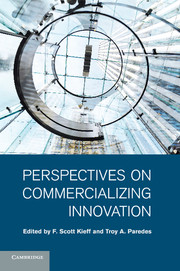Book contents
- Frontmatter
- Contents
- Contributors
- Dedication
- Acknowledgments
- Introduction
- Part I Perspectives on Theories of Intellectual Property
- Part II Perspectives on the Problems of Anticommons and Patent Thickets
- 6 Engineering a Deal
- 7 Understanding the RAND Commitment
- 8 Embryonic Inventions and Embryonic Patents
- 9 Innovation and Its Discontents
- Part III Perspectives on Finance and Commercialization
- Part IV Perspectives on the University Innovation
- Part V Perspectives on International Considerations
- Index
- References
8 - Embryonic Inventions and Embryonic Patents
Prospects, Prophesies, and Pedis Possessio
from Part II - Perspectives on the Problems of Anticommons and Patent Thickets
Published online by Cambridge University Press: 05 December 2011
- Frontmatter
- Contents
- Contributors
- Dedication
- Acknowledgments
- Introduction
- Part I Perspectives on Theories of Intellectual Property
- Part II Perspectives on the Problems of Anticommons and Patent Thickets
- 6 Engineering a Deal
- 7 Understanding the RAND Commitment
- 8 Embryonic Inventions and Embryonic Patents
- 9 Innovation and Its Discontents
- Part III Perspectives on Finance and Commercialization
- Part IV Perspectives on the University Innovation
- Part V Perspectives on International Considerations
- Index
- References
Summary
[A] patent is not a hunting license. It is not a reward for the search, but compensation for its successful conclusion.
– Brenner v. MansonFor since, as a practical matter, exploration must precede the discovery of minerals, and some occupation of the land ordinarily is necessary for adequate and systematic exploration, legal recognition of the pedis possessio of a bona fide and qualified prospector is universally regarded as a necessity.
– Union Oil Co. v. SmithThese two passages, written by the Supreme Court within a fifty-year period, represent two differing approaches to the grant of property rights through a so-called rule of capture. The quote from Brenner v. Manson harks back to the one of the most celebrated rule-of-capture cases in property law: Pierson v. Post, which famously held that “pursuit alone vests no property or right in the huntsman.” The quote from Union Oil Co. v. Smith sets forth the alternative practice, which has long been part of the federal law governing the award of property in oil, gas, and other mineral rights. In that branch of property, pursuit alone does confer on the seeker or prospector some rights, known as pedis possessio or “foothold” rights. Such rights are not full property rights – those can be claimed only upon the completion of prospecting claims with a successful discovery of the mineral deposit. They are instead embryonic property rights, good only “for a reasonable time” while the prospector “remains in possession, diligently working towards discovery.”
- Type
- Chapter
- Information
- Perspectives on Commercializing Innovation , pp. 234 - 267Publisher: Cambridge University PressPrint publication year: 2011



